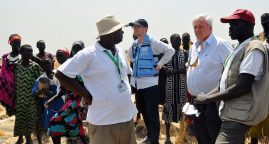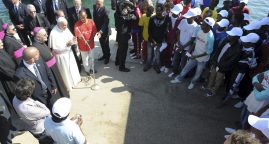Three years since their genocide began, the Rohingya remain desperate for help
Article published on The Wahington Post website on 30/08/2020
“THE STRUGGLE of man against power,” wrote Czech novelist Milan Kundera, “is the struggle of memory against forgetting.” This is precisely where the Rohingya Muslims find themselves today, three years after 750,000 people were terrorized and torched out of their homes by Myanmar’s security forces and forced into miserable camps in Bangladesh. The crimes against the Rohingya — and their ongoing misery — must not be forgotten.
In August 2017, Rohingya militants attacked police posts in northern Rakhine state, killing 12 members of the security forces. Myanmar’s security forces responded starting Aug. 25 with a scorched-earth campaign against the Rohingya population of Rakhine state, in the western part of the country. Thousands of civilians were killed, their villages burned to the ground, and some 750,000 people fled for their lives to Bangladesh. The violence included massacres. On Sept. 2, 10 Rohingya men from the village of Inn Din were roped together and killed. At least two had been hacked to death by Buddhist villagers, and the rest were shot by Myanmar’s security forces, according to Reuters, which interviewed witnesses to the massacre and exposed it. Later, the Myanmar authorities cleared away the Rohingya homes and paved over the Rohingya villages to create new government barracks.
Today, the Rohingya plight remains desperate. There are now about 1 million people living in five refugee camps of bamboo and plastic shelters over an area equivalent to about a third of Manhattan. Children make up about half of them. The refugees fear resettlement in Myanmar would subject them to more deprivation and violence, and efforts to negotiate a return to Rakhine state have failed twice, in 2018 and 2019. The refugees have followed closely as their case was taken up by the International Court of Justice, which ruled in January that Myanmar must implement emergency measures to protect them against violence and preserve evidence of possible genocide. The ruling came after Myanmar’s leader, Nobel Peace laureate Aung San Suu Kyi, personally argued before the court in The Hague that the Rohingya exodus had not been mass murder. The Myanmar government has rejected the court’s ruling, which is only the first step in a process that will probably take years.
It is time to call the Rohingya destruction what it is: a crime against humanity, and genocide. The definition of “genocide” in international law is: “any of the following acts committed with intent to destroy, in whole or in part, a national, ethnical, racial or religious group, as such: killing members of the group; causing serious bodily or mental harm to members of the group; deliberately inflicting on the group conditions of life calculated to bring about its physical destruction in whole or in part; imposing measures intended to prevent births within the group; [and] forcibly transferring children of the group to another group.”
Using the word “genocide” won’t bring the Rohingya home. But it will serve as a reminder to Aung San Suu Kyi — and to the world — of what happened. It will help the struggle of memory not to forget — neither the crime nor the urgent need for redress.
Related Articles
UN aid chief urges global action as starvation, famine loom for 20 million across four countries
03/10/2017. We are facing the largest humanitarian crisis since the creation of the UN,” UN Emergency Relief Coordinator.
A Conversation With Nikki Haley
03/30/2017. The Ambassador discusses the United States’ goals for its term as president of the UN Security Council in April, and outlines her plans to highlight human rights and to assess current UN peacekeeping missions.
New Vatican emphasis on ‘20 action points’ for migrants, refugees
11/08/2017. In recent days, Pope Francis and a Vatican official have cited “Responding to Migrants and Refugees: Twenty Action Points”





